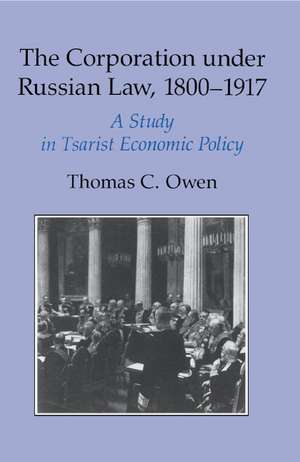The Corporation under Russian Law, 1800–1917: A Study in Tsarist Economic Policy
Autor Thomas Cowenen Limba Engleză Hardback – 25 apr 1991
| Toate formatele și edițiile | Preț | Express |
|---|---|---|
| Paperback (1) | 285.16 lei 6-8 săpt. | |
| Cambridge University Press – 24 iul 2002 | 285.16 lei 6-8 săpt. | |
| Hardback (1) | 694.23 lei 6-8 săpt. | |
| Cambridge University Press – 25 apr 1991 | 694.23 lei 6-8 săpt. |
Preț: 694.23 lei
Preț vechi: 780.03 lei
-11% Nou
Puncte Express: 1041
Preț estimativ în valută:
132.85€ • 142.05$ • 110.76£
132.85€ • 142.05$ • 110.76£
Carte tipărită la comandă
Livrare economică 17 aprilie-01 mai
Preluare comenzi: 021 569.72.76
Specificații
ISBN-13: 9780521391269
ISBN-10: 0521391261
Pagini: 262
Dimensiuni: 152 x 229 x 19 mm
Greutate: 0.52 kg
Editura: Cambridge University Press
Colecția Cambridge University Press
Locul publicării:New York, United States
ISBN-10: 0521391261
Pagini: 262
Dimensiuni: 152 x 229 x 19 mm
Greutate: 0.52 kg
Editura: Cambridge University Press
Colecția Cambridge University Press
Locul publicării:New York, United States
Cuprins
List of tables; Preface; Abbreviations; 1. Zakon (the law), 1800–56; 2. Birzhevaia goriachka (stock-exchange fever), 1856–70; 3. Proval reformy (the failure of reform), 1860–74; 4. Opeka (tutelage), 1865–90; 5. Proizvol (arbitary acts), 1880–1905; 6. Bezobrazie (outrage), 1905–14; 7. Tupik (dead end), 1914–17; 8. Autocracy, corporate law, and the dilemma of cultural delay; Selected bibliography; Index.
Recenzii
"This important work strikingly enumerates the obstacles to Russia's catching up with Europe in the six decades between the Crimean and First World Wars. Owen uses corporate law to make his point.This is an informative, even important book. Little, too little, has been written about Russian law before the Soviets. Owen's relating the law to economic development provides an insight on late tsarist-Soviet continuity." Albert J. Schmidt, Slavic Review
"This excellent study of corporate law and bureaucratic politics draws copiously on the relevant governmental archives and trade associations' records, as well as Owen's statistcal profiles of the 4,439 (!) corporations chartered before 1914....As a substantial contribution to our knowledge of nineteenth-century Russian legal and corporate history, its analyses and intimations are particularly timely in the current period of renewed interest in corporate enterprise in Russia." Walter J. Gleason, Jr., History
"This indispensable work provides a new starting point for the further study of tsarist and Soviet economic history. The extensive notes and bibliography alone constitute valuable research aids. And the book is not only relevant for scholars: lest they repeat the errors of their predecessors, Russian government officials should be required to read it immediately." Steven G. Marks, American Historical Review
"Owen's work significantly contributes to our understanding of the little-studied areas of law and corporate organization in the Russian Empire." William G. Wagner, Russian Review
"...a prime example of careful and thoughtful scholarship....Owen's study should be compulsory reading for all Russian officials caught up in the drafting of 'civilized' legislation for the Russian republic." Paul R. Gregory, Journal of Modern History
"This excellent study of corporate law and bureaucratic politics draws copiously on the relevant governmental archives and trade associations' records, as well as Owen's statistcal profiles of the 4,439 (!) corporations chartered before 1914....As a substantial contribution to our knowledge of nineteenth-century Russian legal and corporate history, its analyses and intimations are particularly timely in the current period of renewed interest in corporate enterprise in Russia." Walter J. Gleason, Jr., History
"This indispensable work provides a new starting point for the further study of tsarist and Soviet economic history. The extensive notes and bibliography alone constitute valuable research aids. And the book is not only relevant for scholars: lest they repeat the errors of their predecessors, Russian government officials should be required to read it immediately." Steven G. Marks, American Historical Review
"Owen's work significantly contributes to our understanding of the little-studied areas of law and corporate organization in the Russian Empire." William G. Wagner, Russian Review
"...a prime example of careful and thoughtful scholarship....Owen's study should be compulsory reading for all Russian officials caught up in the drafting of 'civilized' legislation for the Russian republic." Paul R. Gregory, Journal of Modern History
Descriere
The story of the uneasy accommodation between tsarist autocracy and the modern corporation.












